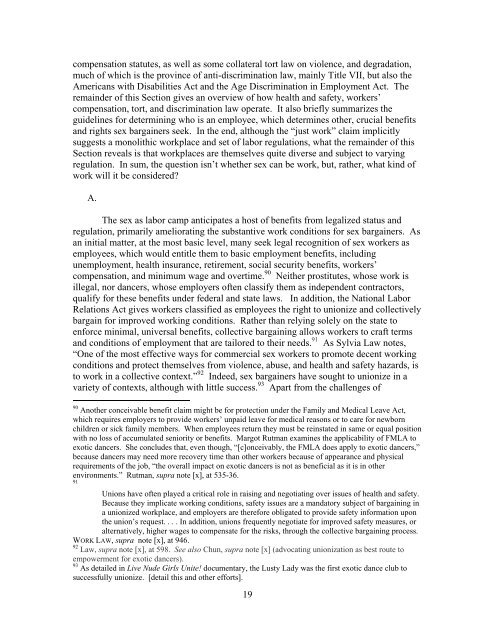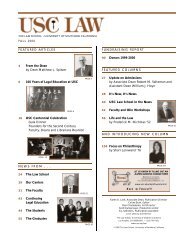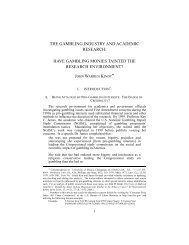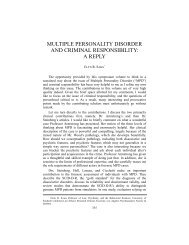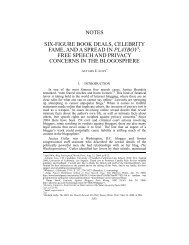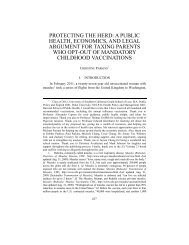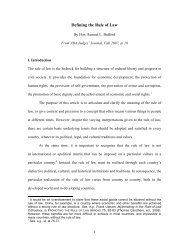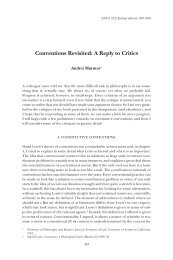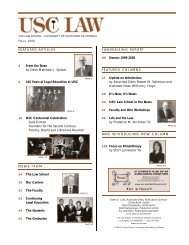1 Regulating Sex Work Adrienne D. Davis VERY ROUGH DRAFT ...
1 Regulating Sex Work Adrienne D. Davis VERY ROUGH DRAFT ...
1 Regulating Sex Work Adrienne D. Davis VERY ROUGH DRAFT ...
You also want an ePaper? Increase the reach of your titles
YUMPU automatically turns print PDFs into web optimized ePapers that Google loves.
compensation statutes, as well as some collateral tort law on violence, and degradation,<br />
much of which is the province of anti-discrimination law, mainly Title VII, but also the<br />
Americans with Disabilities Act and the Age Discrimination in Employment Act. The<br />
remainder of this Section gives an overview of how health and safety, workers’<br />
compensation, tort, and discrimination law operate. It also briefly summarizes the<br />
guidelines for determining who is an employee, which determines other, crucial benefits<br />
and rights sex bargainers seek. In the end, although the “just work” claim implicitly<br />
suggests a monolithic workplace and set of labor regulations, what the remainder of this<br />
Section reveals is that workplaces are themselves quite diverse and subject to varying<br />
regulation. In sum, the question isn’t whether sex can be work, but, rather, what kind of<br />
work will it be considered?<br />
A.<br />
The sex as labor camp anticipates a host of benefits from legalized status and<br />
regulation, primarily ameliorating the substantive work conditions for sex bargainers. As<br />
an initial matter, at the most basic level, many seek legal recognition of sex workers as<br />
employees, which would entitle them to basic employment benefits, including<br />
unemployment, health insurance, retirement, social security benefits, workers’<br />
compensation, and minimum wage and overtime. 90 Neither prostitutes, whose work is<br />
illegal, nor dancers, whose employers often classify them as independent contractors,<br />
qualify for these benefits under federal and state laws. In addition, the National Labor<br />
Relations Act gives workers classified as employees the right to unionize and collectively<br />
bargain for improved working conditions. Rather than relying solely on the state to<br />
enforce minimal, universal benefits, collective bargaining allows workers to craft terms<br />
and conditions of employment that are tailored to their needs. 91 As Sylvia Law notes,<br />
“One of the most effective ways for commercial sex workers to promote decent working<br />
conditions and protect themselves from violence, abuse, and health and safety hazards, is<br />
to work in a collective context.” 92 Indeed, sex bargainers have sought to unionize in a<br />
variety of contexts, although with little success. 93 Apart from the challenges of<br />
90<br />
Another conceivable benefit claim might be for protection under the Family and Medical Leave Act,<br />
which requires employers to provide workers’ unpaid leave for medical reasons or to care for newborn<br />
children or sick family members. When employees return they must be reinstated in same or equal position<br />
with no loss of accumulated seniority or benefits. Margot Rutman examines the applicability of FMLA to<br />
exotic dancers. She concludes that, even though, “[c]onceivably, the FMLA does apply to exotic dancers,”<br />
because dancers may need more recovery time than other workers because of appearance and physical<br />
requirements of the job, “the overall impact on exotic dancers is not as beneficial as it is in other<br />
environments.” Rutman, supra note [x], at 535-36.<br />
91<br />
Unions have often played a critical role in raising and negotiating over issues of health and safety.<br />
Because they implicate working conditions, safety issues are a mandatory subject of bargaining in<br />
a unionized workplace, and employers are therefore obligated to provide safety information upon<br />
the union’s request. . . . In addition, unions frequently negotiate for improved safety measures, or<br />
alternatively, higher wages to compensate for the risks, through the collective bargaining process.<br />
WORK LAW, supra note [x], at 946.<br />
92<br />
Law, supra note [x], at 598. See also Chun, supra note [x] (advocating unionization as best route to<br />
empowerment for exotic dancers).<br />
93<br />
As detailed in Live Nude Girls Unite! documentary, the Lusty Lady was the first exotic dance club to<br />
successfully unionize. [detail this and other efforts].<br />
19


